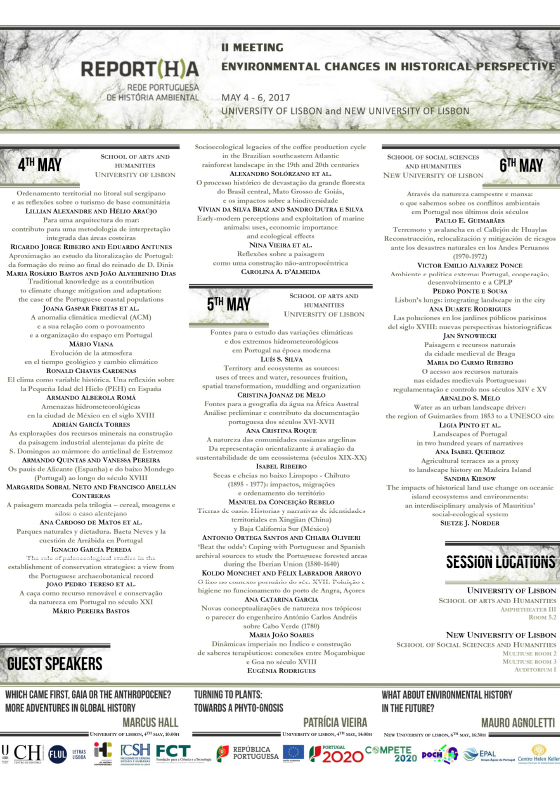Environmental Changes in Historical Prespective | II Meeting REPORT(H)A | Rede Portuguesa de História Ambiental
Faculdade de Letras da Universidade de Lisboa, Anfiteatro III e Sala 5.2, dias 4 e 5 de Maio de 2017
Organização | Centro de História da Universidade de Lisboa; Instituto de História Contemporânea
Descarregar Cartaz
Descarregar Programa
Descarregar Livro de Resumos
Inscrições para assistência e materiais de apoio

The Centro de História of the Faculdade de Letras da Universidade de Lisboa (CH-ULisboa) / Center of History of the Faculty of Arts and Humanities of the University of Lisbon and the Instituto de História Contemporânea of the Faculdade de Ciências Sociais e Humanas da Universidade Nova de Lisboa (IHC-FCSH, UNL) / Institute of Contemporary History of the Faculty of Social Sciences and Humanities of the New University of Lisbon, are pleased to be hosting the II meeting of REPORT(H)A - Portuguese Network of Environmental History, in 2017 Spring.
REPORTHA was created in 2015, following the WCEH 2014 - Second World Congress of Environmental History, held in Guimarães and had the first meeting in 2015, in the scope of the IV CITCEM conference (5-7 november, Faculty of Arts of the University of Porto).
Following these initiatives, the II meeting REPORT(H)A intends to bring together researchers, teachers, students and experts on environmental history from the fields of human, social and natural sciences in order to create synergies among all scholars engaged in environmental history and stimulate the debate on an issue that has gained considerable visibility over the last decades.
The cross cutting conference theme Environmental Changes in Historical Perspective is inscribed in transnational and transdisciplinary approaches, a challenge to the current academic research and debate in environmental sciences and humanities. It aims to be a bridge between different forms of knowledge and between different geographical and social spaces, while putting them into a meaningful context. Thus, the conference welcomes innovative approaches contributing to a lively exchange of ideas and experiences as well as on new perspectives, concepts, methodologies and processes in the field of Environmental History.

